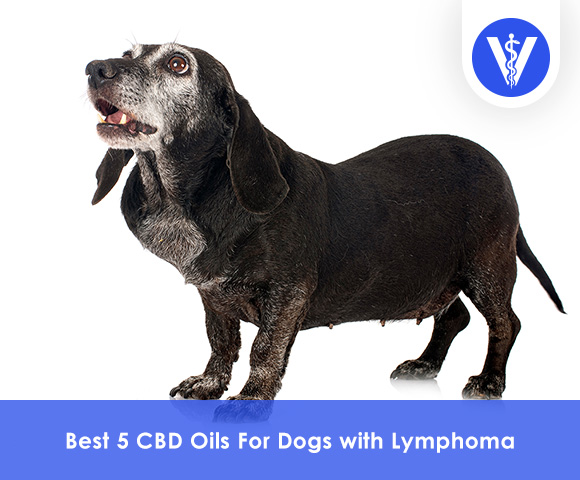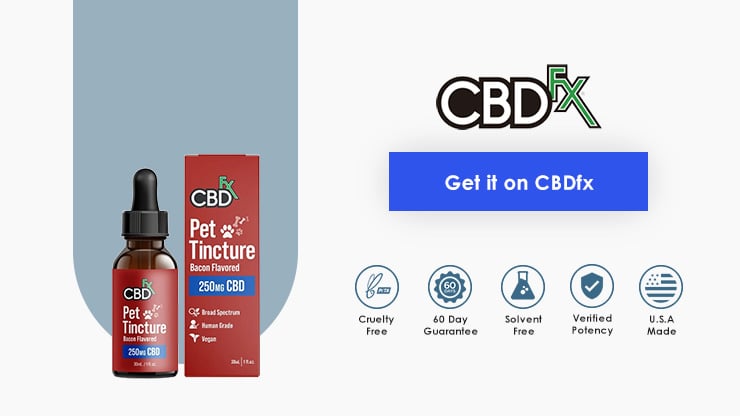5 CBD Oils For Dogs with Lymphoma

Table of Contents
CBD oils for dogs with lymphoma are used to reduce inflammation and manage stress and pain from the effects of cancerous growth in dogs. Dog lymphoma is cancer originating from the lymphocytes, white blood cells concentrated in lymphoid organs such as the spleen, tonsils, lymph nodes, and bone marrow.
Dog lymphoma causes swelling of the lymph nodes all around the body, and specific organs are impacted significantly depending on the tumor’s localization. Clinical signs of dogs with lymphoma range from diarrhea and vomiting to coughing and shortness of breath. Lymphatic cancer in dogs metastasizes and spreads to more organ systems and causes a mixture of these clinical signs.
CBD contains the compound cannabidiol, a hemp-derived substance that supports dogs with pain, inflammation, and anxiety by interacting with endocannabinoid receptors that regulate the body’s inflammatory mediators to control pain and promote a feeling of well-being. Studies have demonstrated CBD has anti-cancer and anti-proliferative properties in canine cancers.
Treating lymphoma in dogs requires a veterinarian-designed treatment plan of chemotherapeutic agents on a regular basis with ongoing monitoring. CBD is not suitable as a standalone treatment for dogs with glaucoma, but it assists with providing support and relief from the symptoms of the disease and the side effects of the chemotherapy.
Consult a veterinarian for the optimal way to incorporate CBD into the lymphoma management plan. Choose high-quality, organic, non-GMO, human-grade, and full-spectrum CBD Oils from reputable brands when using CBD as a supplement for dogs with lymphoma. The top CBD oils for dogs with lymphoma are Honest Paws, Batch CBD, and Penelope’s Bloom.
1. Honest Paws CBD Oil
Honest Paws CBD Oil is a tincture containing organic full-spectrum hemp oil and chamomile extract suspended in organic MCT (medium-chain triglycerides) oil. The product comes in 125 mg, 250 mg, and 100 mg preparation bottles. The Honest Paws CBD brand recommends giving one full dropper for dogs with lymphoma once a day or as directed by a veterinarian.
The pros of Honest Paws CBD Oil are that it is approved by the National Animal Supplement Council, and it is made with organic, high-quality, non-GMO (genetically modified organisms) products. The brand provides a Certificate of Analysis (COA) from a third-party laboratory as a testament to its trustworthiness and lists customer reviews customers on its website.
The only con is the occasional unavailability due to high demands.
Their 25 mg oil costs $39.25 dollars as a one-time purchase, and the 1000 mg oil costs $99.95.
Customers say the treats are well-tolerated by their pets, improving their overall health and well-being and making them brighter and happier.
“I bought this oil to see if it helped my 11.5-year-old, 110 lb. Great Pyr mix feels better. Her name is Scout. My subjective assessment is she seems “brighter,” she is resting more peacefully, and is smiling again. I bought the concentrated oil and am still adjusting the dosage, but I am pleased and will continue to use it to support Scout as long as I can see that it helps her feel better.”
2. Penelope’s Bloom CBD Oil
Penelope’s Bloom CBD Oil is a pet CBD oil containing organic MCT oil, organic hemp extract, and organic chamomile oil. The product features 30 ml bottles of 250 mg, 500 mg, 750 mg, and 1000 mg preparations for dogs with lymphoma.
Penelope’s Bloom brand recommends administering one dropper orally or mix in food daily or as needed.
The pros of Penelope’s Bloom are that they are vegan, non-GMO, and third-party laboratory tested with a link on their website that displays the results for each product. Their CBD Oil for dogs comes in a variety of preparations that cater to dogs of all sizes.
The 250 mg bottle costs $29.99, the 500 mg bottle costs $44.99, the 750 mg bottle costs $59.99, and the 1000mg bottle costs $74.99.
Customers leave positive reviews on how the product has improved their pets’ quality of life by making their day-to-day activities more tolerable.
“My pup has been on this product for about 2-3 weeks, it has definitely made an impact on his everyday life. Overall the pup is in a better mood and more willing to go on walks. Thank you so much for improving my pup’s quality of life”
3. Batch CBD Oil
Batch CBD Oil is a brand that sells CBD oil for human consumption. The pet CBD oil features purified hemp extract containing three different cannabinoids: Cannabidiol (CBD), Cannabigerol (CBG), and Cannabichromene (CBC). It is a tincture of 750mg in a 30ml bottle that comes in bacon, chicken, and salmon flavors. The ingredients are organic MCT coconut oil, raw hemp extract (Aerial Parts), and bacon, chicken, or salmon oil. The product helps support dogs with lymphoma. The brand recommends a dosage of 3-5 mg of CBD for every 10 pounds of the dog’s body weight.
The pros of Batch CBD Oil are that they use high quality, non-GMO ingredients, with published laboratory reports on their website for customers to review. Their products have a variety of flavors available.
The main con is the use of three health-promoting cannabinoids instead of a wider specter of healthy cannabinoids.
Batch CBD 30 ml bottle of 750 mg costs $48.74. Customers rave about the product’s palatability and how it has improved their pets’ mood.
“What could be better than BACON CBD? Our old guy Hairy Truman, Dane/Ridgeback (Tru is 12 years old) he loves it because it helps him get around more easily. It puts the bounce back in his step.”
4. Four Leaf RoverCBD Oil
Four Leaf Rover CBD Oil is a full-spectrum organic hemp oil that contains CBD, CBC (cannabichromene), CBN (cannabinol), CBG (cannabigerol), which are other cannabinoids with similar benefits, and CBA (a proprietary complex of copaiba and passionfruit seed oils). Ingredients for the product include organic full-spectrum hemp oil with human-grade MCT oil as its base.
The Four Leaf RoverCBD Oil comes in 30ml bottles of 500mg and 1000mg preparations. The brand recommends one full dropper a day orally, with the strength dependent on the disease stage for dogs with lymphoma.
The pros of Four Leaf Rover CBD are that they use organic hemp that was extracted using supercritical carbon dioxide, with a certificate of analysis from a third-party laboratory for all products published on the website.
The cons are that it has a higher price range and is only available in the United States.
The 500mg bottle costs $69.99, and the 1000mg bottle costs $109.99 as a one-time purchase.
Customers leave reviews on how the product has helped minimize the size of tumors in their pets and improve their mobility.
“My dog has a large fatty tumor under her leg. The second day on CBD, she was mobile and happy. Thank you so much for offering this product.”
5. CBDfx CBD Oil
CBDfx CBD Oil is a pet CBD oil containing organic broad-spectrum CBD that is available in 30 ml bottles of 250 mg, 500 mg, 750 mg, and 100 mg preparations. The ingredients are CBD-rich hemp oil, MCT oil, and natural bacon or chicken flavor. The brand recommends giving a dog half a dropper in the morning and half at night.
The pros of CBDfx CBD Oil are that they are non-GMO, organic, and are certified cruelty-free by PETA. The website features published laboratory reports on their website and comes in tasty chicken and bacon flavors for easy dosing.
The only con is the broad instead of full-spectrum extract formulation.
Their product price range is from $29.99 for the lowest strength bottle and $99.99 for the strongest strength bottle.
Many customers have left reviews raving about the product’s effectiveness for dogs with anxiety and old dogs with tumors.
“She loves the cod bacon flavor. She seems to be more energetic and hope this helps with the tumors…thanks”
How Can CBD Oil Help Dogs with Lymphoma?
CBD Oil can help dogs with lymphoma by soothing the painful symptoms associated with the disease. The lymphoid cancers disrupt the normal physiological functions of the body, thus making it hard for dogs with lymphoma to go about their daily lives as they live in chronic pain.
CBD oil for dogs with lymphoma reduces discomfort by providing anti-inflammatory and antioxidant properties. The inflammatory action of CBD revolves around the activation of endocannabinoid receptors CB1 and CB2. These receptors are predominantly expressed in the central nervous system and the immune system. The activation of these receptors leads to a decrease in ROS (Reactive Oxygen Species) and TNF-α (Tumor Necrosis Factor Alpha) levels, which reduces oxidative stress and inflammation. CBD reduces oxidative conditions by preventing the formation of superoxide radicals and reactive oxygen species that cause damage to optic nervous tissue. Triggering endocannabinoid receptors CB1 and CB2 promotes relaxation by having an anxiolytic and anti-stress effect on the nervous system, thus helping dogs with lymphoma.
A 2020 study titled “The effect of cannabidiol on canine neoplastic cell proliferation and mitogen-activated protein kinase activation during autophagy and apoptosis” showed CBD significantly reduced canine cancer cell proliferation and induced apoptosis rapidly across neoplastic cell lines.
A 2016 study titled “Endocannabinoid system as a regulator of tumor cell malignancy – biological pathways and clinical significance” discusses the main signaling pathways involved in the antitumor activity of cannabinoids and the influence of their activation on cancer cell biology. The authors noted that in vivo studies of oral cannabinoids have shown a reduction in tumor growth seen in the Lewis lung adenocarcinoma mouse model. Further clinical trials are needed to understand CBD’s efficacy and interactions with traditional chemotherapy for dogs with lymphoma.
CBD for dogs with lymphoma calls for an understanding of “What is CBD?” CBD, or cannabidiol, is a natural compound extracted from the hemp plant. CBD helps with pain and inflammation naturally by interacting with the dog’s endocannabinoid system (ECS).
Dogs respond uniquely to CBD. Mild sedation is the typical response to the anxiolytic and anti-inflammatory effects of the CBD. Dogs feel less stressed and have improved mood and behavior. A large pool of anecdotal evidence provided by dog owners shows CBD has dramatically enhanced their dogs’ wellbeing.
How Does Lymphoma Affect Dogs?
Lymphoma affects dogs by disrupting the normal physiological processes of the organ to which the tumor localizes. The most common type of dog lymphoma primarily manifests as enlarged, firm, and non-painful lymph nodes. Alimentary lymphomas in the intestines cause the dog to have gastrointestinal symptoms such as vomiting and diarrhea. Mediastinal lymphomas in the chest cause the dog to have difficulty breathing as the tumor presses on the thoracic organs. In malignant lymphomas, extranodal tumors affect other body parts and cause damage. Some early behavioral signs of dog lymphoma include lethargy or weakness, fever, loss of appetite, weight loss, increased thirst, and increased urination.
What is Dog Lymphoma?
Dog lymphoma is cancer of lymphocytic origin that account for 7% to 24% of cancers in dogs. Lymphocytes are a type of white blood cell that concentrate in lymphoid organs such as the tonsils, spleen, bone marrow, and lymph nodes, where tumors typically form.
Dog lymphoma metastasizes and reaches non-lymphoid organs like the skin, kidneys, and eyes as well.
The etiology of canine lymphoma is not definitively understood, but the majority of science behind its cause has been linked to studies on human lymphomas that have traced it to factors such as exposure to phenoxyacetic acid, toxic substances produced during the breakdown of chemicals, pesticides, fungicides, medications, and chemical dyes.
A 2018 study published in the ACVIM Journal of Veterinary Internal Medicine titled “Demographic risk factors for lymphoma in Australian dogs: 6201 cases” aimed to identify and quantify the host risk factors for dogs with lymphoma in a broad population of Australian dogs and showed that breed, sex, and neuter status alter the risk of lymphoma in dogs.
What are Symptoms of Dog Lymphoma?
The symptoms of dog lymphoma are listed below.
- Swollen lymph nodes: Lymph node swelling is a symptom of the most common kind of lymphoma: Multicentric lymphomas. The lymph nodes undergo rapid and non-painful enlargement over three to 10 times their normal size. Tumors spread to other body parts in the later stage of the disease, and when dogs with lymphoma have multiple, large tumors, they show signs of illness, such as lack of energy, weakness, fever, loss of appetite, and dehydration.
- Vomiting and abdominal pain. Alimentary lymphomas cause gastric upset as they localize in the intestines. Tumors that localize in the intestines cause significant issues for dogs with lymphoma as they cause loss of appetite, vomiting, diarrhea, and continued weight loss because they are unable to digest food properly.
- Chest pains and difficulty breathing. Mediastinal lymph nodes are growths that are localized in the space within the dog’s upper chest that contains a variety of organs: the heart, esophagus, trachea, and thymus. The growths cause fluid buildup in the chest, which puts pressure on the lungs.
- Polydipsia and Polyuria. An increased volume of drinking and urination has been seen in 10-40% of dogs with mediastinal lymphomas. Mediastinal lymphomas are caused by an increase in calcium in the blood. Abnormally high calcium levels trigger the kidney’s response to create more urine and increased thirst to normalize the body’s calcium levels.
- Organ Failure. Extranodal lymphomas are those that occur outside of the lymphoid organs. They affect the skin by creating raised, scaly sores that are slow-healing. Extranodal lymphomas affect the kidneys, and renal failure occurs when the renal architecture is destroyed. The lymphoma causes blindness if they are localized in the eyes. Lymphomas in the brain affect the dog’s central nervous system, manifesting in seizures.
How to Diagnose Dogs’ Lymphoma?
To diagnose dog’s lymphoma, a veterinarian performs a Fine Needle Aspiration. The process involves poking a needle through the suspected mass and extracting a sample. The sample is later evaluated through a cytology exam or histopathologic tissue evaluation.
“Staging tests” are necessary to evaluate how far along the disease has spread through the dog’s body. Dogs with lymphoma undergo staging tests that include blood tests, a urinalysis, x-rays of the chest and abdomen, an abdominal sonogram, and a bone marrow aspirate. The veterinarian identifies the stage of canine lymphoma through the following criteria.
Stage I: Involves a single lymph node.
Stage II: Affects multiple lymph nodes in one region.
Stage III: All lymph nodes affected (generalized).
Stage IV: Involves lymph nodes and organs such as the liver, spleen, or chest.
Stage V: Involves the bone marrow.
What are the Causes of Dogs’ Lymphoma?
The causes of dogs’ lymphoma are listed below.
- Exposure to toxic substances. Dogs with lymphoma are exposed to harmful chemicals like phenoxyacetic acid, toxic substances produced during the breakdown of pesticides, fungicides, medications, and chemical dyes are considered risk factors for canine lymphoma.
- Genetic disposition. Breeds such as Golden Retrievers, Beagles, Saint Bernard, and Rottweiler have been shown to have a higher prevalence of dog lymphoma than other breeds.
- Environmental factors. Viruses, infections, age, and UV damage are possible contributors to dogs with lymphoma, but further study is required.
Can CBD Treat Dogs’ Lymphoma?
No. CBD cannot treat dogs’ lymphoma. CBD is used as a supplemental aid for soothing clinical signs and symptoms of dogs with lymphoma. Consult a veterinarian to determine the appropriate dosage for the stage of the disease.
A 2020 study entitled “The effect of cannabidiol on canine neoplastic cell proliferation and mitogen-activated protein kinase activation during autophagy and apoptosis”, CBD significantly reduced canine cancer cell proliferation and induced apoptosis rapidly across neoplastic cell lines.
A 2016 study entitled “Endocannabinoid system as a regulator of tumor cell malignancy – biological pathways and clinical significance” discusses the main signaling pathways involved in the antitumor activity of cannabinoids and the influence of their activation on cancer cell biology.
Further research is needed to determine whether CBD for dogs is considered a viable treatment option for lymphatic cancer in dogs. Stop CBD administration in the unlikely event the dog reacts poorly to the CBD.
Is CBD Oil Safe for Dogs?
Yes. CBD is safe for dogs. Choose high-quality CBD oil and consult a veterinarian about the most appropriate dosage for dogs with lymphoma.
Studies in humans have shown that CBD is able to elevate liver enzymes such as AST, which is a protein made by liver cells, and inactivate cytochrome P450 3A and P450 2C, which are enzymes needed for hepatic metabolism that are needed to biotransform certain drugs into their active form. These interactions must be considered when co-administering CBD with other medications.
CBD is not an FDA-approved or regulated substance, which means there is a large variation in the quality of CBD products available. Further studies are required on lymphatic cancer in dogs, but the answer is “yes” for pet owners wondering, “Is CBD safe for animals?”. Provided CBD is THC-free, comes with a Certificate of Analysis, and the pet owner understands the ingredients, pet CBD oil is safe to use for dogs.
Is Lymphoma a Type of Cancer for Dogs?
Yes, lymphoma is a type of cancer for dogs. Lymphomas are a cancer of the lymphoid organs that have the potential to metastasize into other non-lymphoid organs. CBD oil for dogs with cancer helps relieve the symptoms in dogs with lymphoma. Malignant lymphomas are a progressive, deadly disease caused by the harmful growth of lymphocytes affecting the dog’s normal physiological functioning, behavior, and overall well-being.
What are Common Treatments for Dogs with Lymphoma?
The common treatments for dogs with lymphoma are chemotherapy, radiation, surgery, and Verdinexor.
The chemotherapy protocol is called CHOP and consists of multiple chemotherapy drugs like vincristine, cyclophosphamide, doxorubicin, and L-asparaginase. Dogs with lymphoma undergoing chemotherapy experience hair loss and bone marrow suppression.
Radiation therapy is recommended for dogs with localized forms of lymphoma. The treatment is able to be used alone or in conjunction with other approaches, such as surgery and chemotherapy.
Surgical removal of the mass is able to be used for dogs with lymphoma that are stable and have localized tumors that have not spread across other organs or areas of the body. Surgery is limited to benign lymphomas only.
Laverdia-CA1 Tablets (Verdinexor) is an FDA-approved oral tablet for treating canine lymphoma, which works by stopping proteins from leaving the cancer cells’ nuclei, making the cancer unable to grow and spread.
How to Make a Dog with Lymphoma Comfortable with CBD?
To make a dog with lymphoma comfortable with CBD, follow the following steps.
- Consult a veterinarian. Establish the veterinary treatment plan with a veterinarian to determine the most appropriate CBD treatment.
- Get advice on CBD use. Ask the veterinarian about the correct dosage and formulation and how CBD affects dogs. Learn how to check each CBD product and determine the intended effect of these ingredients.
- Choose an appropriate product. The best CBD pet product is made from 100% food grade, non-GMO, pesticide and herbicide-free hemp. The best extraction method is CO2 extraction, which safely and effectively pulls the bioactive compound of hemp without altering its quality. Examine third-party laboratory test results for CBD purity and potency.
- Follow the recommended dosage. Each CBD product has its own indicated instructions for use and dosage. Check each CBD product for composition and dosage. Conduct research about unfamiliar ingredients, check the laboratory analysis, and cross-reference the contents to the laboratory reports. The recommended dosage of CBD for dogs is between 1 and 5 mg of CBD per 10 pounds of body weight daily, but the exact dose depends on the dog’s current state. Always consult a veterinarian before giving CBD for treating lymphoma in dogs so the interaction of CBD with conventional medicine is considered.
What are Different Types of Lymphoma for Dogs?
The different types of lymphoma for dogs are listed below.
- Multicentric Lymphoma. The most common form of canine lymphoma accounts for 80%-85% of cases of dogs with lymphoma. An early sign of multicentric lymphoma is the rapid and non-painful enlargement of lymph nodes. Cancerous lymphocytes circulate and move toward other organs, causing larger, more problematic tumors.
- Alimentary Lymphoma. Lymphomas occur in the alimentary or intestinal tract. The tumor interferes with the normal physiology of the intestines and causes gastrointestinal upset like vomiting, diarrhea, and abdominal pain.
- Mediastinal Lymphoma. The tumors occur in the dog’s upper chest. The growth puts pressure on adjacent organs like the heart and lungs and their associated vessels and causes chest pains and difficulty breathing, which leads to poor circulation.
- Extranodal Lymphoma. These lymphomas do not occur in the lymphoid tissue but in other organ systems, ranging from the skin, eyes, kidneys, and brain. The clinical signs vary depending on the organ affected.
How Much CBD Oil Can You Give for Dogs with Lymphoma?
You can give dogs with lymphoma 1 to 5 mg of CBD oil per pound of their body weight. The exact amount depends on the stage of the lymphoma and the exact weight of the dog.
Do not focus on the weight of the CBD product. Start by establishing the CBD concentration in the particular CBD product, for example, a dropper, tincture, powder, chew, or cream, and calculate it according to the dog’s weight. A dog that weighs 35 pounds and the CBD oil is prepared at a concentration of 20 mg per full dropper, the dog can consume 1 full dropper (20 mg) a day.
Consult a CBD dosage calculator for the most accurate dosage information for the CBD potency and pound of body weight.
A veterinarian is able to advise on optimal doses of CBD oil for dogs with lymphoma.
How to Choose the Right CBD Oil for your Dogs?
To choose the right CBD Oil for your dogs, follow the steps listed below.
- Choose an Oil Type. Dog CBD oils come in different forms, including full-spectrum, broad-spectrum, and isolates. Full-spectrum CBD contains other cannabinoids, terpenes, flavonoids, and trace amounts of THC (under 0.3%) that interact in synergism to produce better therapeutic effects. Broad-spectrum options contain fewer cannabinoids than full-spectrum, and isolates feature only one cannabinoid. A full-spectrum oil is the best option for dogs with lymphoma.
- Find out the hemp source. Ensure the CBD product is made from organically grown, non-GMO, human-grade hemp. The best hemp is certified free from synthetic pesticides or insecticides otherwise making their way into the finished product.
- Know the extraction method. The extraction method is how the CBD was taken from the Cannabis plant. Good CBD Oil must be extracted using supercritical carbon dioxide as it is a method that essentially “pulls” the active ingredients from the plant with great efficiency and care for the active compound.
- Check the Laboratory Analysis. Double check that the CBD product has a published analysis of the product, that it has been evaluated by a third-party laboratory, and that the contents are true to the safe amount of CBD (not over 0.3%), have little to no THC (Tetrahydrocannabinol) and is safe from contamination. A study from 2020 was published about veterinary hemp products tested for CBD content and found that some labeling was incorrect and the products were contaminated with heavy metals.
- Choose the right flavor. Buy flavored options for fussy-eating dogs to make administration easier for the owner and less stressful for the dog with lymphoma.
Does CBD Oil Have Bad Side Effects for Dogs?
Yes, CBD Oil has bad side effects for dogs. CBD for animals causes lethargy, dizziness, dry mouth, vomiting, diarrhea, increased tremors, itchiness, and low blood pressure.
Side effects of CBD to animals are rare and reduced or eradicated once the correct dosage for dogs with lymphoma is found. CBD causes allergic reactions in canines in rare cases. Stop treatment immediately if the dog exhibits signs of an allergic reaction. Signs of allergic reaction to CBD in dogs include facial swelling, hives, itchiness, and sneezing.
Is Continued CBD Treatment Necessary for Dogs with Lymphoma?
Yes, continued CBD treatment is necessary for dogs with lymphoma.
Chemotherapy is the primary treatment for dogs with lymphoma. Dogs experience side effects from the chemotherapy treatment and continued treatment with CBD for animals alleviates the nausea, loss of appetite and malaise associated with chemotherapy treatment.
Seek veterinary advice for the optimum, ongoing CBD treatment plan for dogs with lymphoma. CBD is ideal for cancer treatment in animals because it helps trigger apoptosis (damage cell demise), inhibit angiogenesis (new blood vessel formation), and prevents metastasis (tumor moving and spreading).
Ongoing CBD treatment in conjunction with traditional veterinary treatment is recommended.
What are the Other Health Conditions that CBD is helpful for Dogs?
The other health conditions that CBD is helpful for dogs are listed below.
- CBD for Anxious Dogs: CBD is known to have a calming effect after use. Its feature is particularly useful in dogs that suffer from stress-borne anxiety. CBD for dogs with anxiety are able to be given as an oil tincture or a chewable to help relax a dog having an anxious episode.
- CBD for Dogs with Atopy: CBD has been studied in dogs diagnosed with atopic dermatitis. CBD reduced the frequency of itching and chewing by at least 50%, and half of the dogs completely recovered.
- CBD for Hyperactive Dogs: CBD for dogs with hyperactivity has a natural calming effect. Hemp CBD products for pets support calmness and relaxation, thus helping manage episodes of hyperactivity in dogs of all breeds and ages.
- CBD for Arthritic Dogs: CBD has been studied to improve mobility in dogs diagnosed with osteoarthritis by over 80%, making them more active after the treatment period.
- CBD for IVDD Dogs: CBD reduces inflammation and pain, and soothes dogs with intervertebral disc disease. IVDD significantly affects the dog as they are in chronic pain. CBD for IVDD dogs alleviates some of the discomfort and improves their well-being.
- CBD for Seizuring Dogs: CBD has anti-convulsive features and prevents seizure activity. Frequent administration of CBD helps reduce the duration and frequency of seizures in dogs
- CBD for Dogs with Glaucoma: CBD has shown effects in reducing intraocular pressure in dogs with glaucoma. CBD for dogs with glaucoma helps reduce inflammation and stress from painful ocular hypertension.
CBD helps dogs with IVDD by inhibiting neuron loss and damage through its neuroprotective features that reduce IVDD-associated pain, inflammation, and anxiety. Dog IVDD occurs when a disc fails to “cushion.” Discs lose their shock-absorbing abilities due to degeneration and herniation, causing spinal cord pressure and pain.
CBD’s positive health effect against IVDD is stronger than the health effects on dogs with lymphoma because lymphoma requires chemotherapy, radiation, and in some cases, surgery.




















